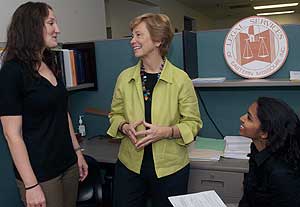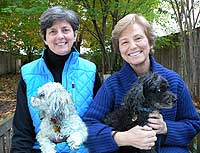Moving north did not have the effect Karen Tokarz, J.D., thought it would.
Growing up in Birmingham, Ala., Tokarz, the Charles Nagel Professor of Public Interest Law & Public Service, saw racism, sexism and poverty from an early age.

“I would read a newspaper story about a local march or a sit-in, and the article would mention that one or two protestors were arrested,” she says. “That night, my mother, who ran the indigent floor of the University of Alabama hospital, would come home and say that they had admitted a hundred prisoner patients that day from the protest. The discrimination was vivid.
“I thought that leaving the South and coming up ‘north’ to St. Louis for college would put me in a place where there was no poverty and no discrimination and no racism, but I quickly learned that it exists everywhere in the world,” she says.
After college, Tokarz began work in public service as a deputy juvenile officer at the St. Louis City Juvenile Court.
“I worked for Judge Ted McMillian, a heroic defender of children’s rights and the first African-American judge appointed to the bench in Missouri, who kept saying if I really wanted to help these kids, fight discrimination and fight poverty, I needed to become a public interest lawyer,” she says.
That advice prompted Tokarz to go to law school and on to work for Legal Services of Eastern Missouri in St. Louis.
Making a difference through teaching
Washington University recruited Tokarz in 1980 to lead and revitalize the school’s Clinical Education Program. Law school clinics give students practical experience and training while providing high-quality legal services for underrepresented people and groups in the community.
“Our clinical courses prepare well-qualified, ethical practitioners and advocates, who become leaders in practice, government and business,” she says. “Clinic students discover firsthand the challenges, responsibilities and rewards of representing clients and practicing law. They see the impact they can have on people’s lives and come to understand the difference between law and justice and the privilege of lawyering.”
Tokarz led the school’s clinical programs until 2008. During her tenure as clinical programs director, she established the law school as a global leader in clinical legal education and helped propel the clinical program to top national rankings; they are now widely regarded as among the best in the world.
Tokarz, who received the Washington University Founders Day Award for exceptional teaching in 2005, continues to direct and teach the Civil Rights & Community Justice Clinic, one of the school’s 12 law clinics.
Kent Syverud, J.D., dean of the law school and the Ethan A.H. Shepley University Professor, emphasizes that Tokarz has achieved three remarkable things at Washington University: “She has assured the delivery of quality legal services to thousands of people who would otherwise lack access to justice; she has taught generations of students how to provide access to justice and to go on to careers in public service; and she has been a leading force in improving legal education at this school and across the nation.”
In her current role as director of the law school’s Dispute Resolution Program, Tokarz helps prepare graduates to be better problem-solvers, negotiators, mediators and conflict-resolvers through courses such as “Mediation Theory & Practice.”
She is collaborating with Syverud, who teaches “Negotiation,” and other faculty in the field to develop a “first-class dispute resolution program for the law school that is both interdisciplinary and international,” she says.

“I see myself and our law school as part of a larger movement that is fostering a new professional role for lawyers — lawyers who are zealous and passionate but also focused on solving disputes more creatively, efficiently and fairly and in ways that preserve relationships as much as possible,” says Tokarz, a widely respected civil rights mediator.
Tokarz and her colleagues have extended the reach of the school’s dispute resolution learning opportunities beyond U.S. borders. Students interested in dispute resolution and human rights have the opportunity to participate in internships in countries such as South Africa, Rwanda, Kenya, Ghana, Thailand, Cambodia, India and China.
For Tokarz, the best part of her job is working with her students.
“Our students are brilliant, talented, committed, determined to fight injustice and change the world,” she says. “There’s a lovely energy in today’s law students to work for the greater good. Most of our law students come to school with the goal to improve the quality of life for people on this planet. They are changing the legal profession, very much for the better.”
As an international leader in clinical legal education and dispute resolution, Tokarz has helped emerging democracies transform legal education in their countries.
“In countries going through a political transition, legal education becomes more open, more diverse,” she says. “In Central and Eastern Europe, Africa and Southeast Asia as well as other parts of the world, one of the first stages of progressive legal education is a move toward clinical education and dispute resolution training. Law schools want and need to prepare a new population of lawyers to practice, to promote rule of law, and to address past discrimination and oppression.”
Tokarz began working with law schools in South Africa on clinical curriculum development in 2001. She since has led a team of six law students to South Africa every summer to spend 10 weeks learning and working at the Legal Aid Board and other human rights organizations in South Africa. Last year, Tokarz worked in South Africa as a Fulbright senior specialist, assisting the University of KwaZulu-Natal in the development of its dispute resolution curriculum.
Tokarz also was a visiting scholar at the Harvard Law School Program on Negotiation last year.
Impacting the University community
Tokarz embodies the collaborative spirit of the University.
For over a decade, she and other women law school faculty colleagues have supervised law students teaching an undergraduate “Women & the Law” course through the Women, Gender, and Sexuality Studies Program in Arts & Sciences.
She holds appointments with the African and African American Studies Program in Arts & Sciences and the Women, Gender, and Sexuality Studies Program, serves on the Gephardt Institute for Public Service’s advisory board, and coordinates the law school’s popular Public Interest Law & Policy Speakers Series, now in its 12th year, designed to foster interdisciplinary discussions on access to justice issues across the University and the community.
|
Karen Tokarz |
|
Position: The Charles Nagel Professor of Public Interest Law & Public Service and director of the Dispute Resolution Program at the School of Law; professor of African & African American studies and affiliate professor in women, gender and sexuality studies, both in Arts & Sciences Education: B.A., Webster University; J.D., Saint Louis University; LL.M., University of California, Berkeley Position: Partner, JoAnne LaSala, an economic development consultant; godchildren Thomas, Cornest, Tawanda, Altarea, Jackie, Bruce, Emanuel and Demetrius Interests: Tennis — she’s still a decent singles player; Cardinals baseball; and travel — she has visited every continent except Antarctica. |
“I love the interdisciplinary nature of both the law school and the University,” she says.
“Washington University is among the world’s leaders in teaching and research, and it provides a wonderfully rich environment within which our faculty and students can teach and learn,” she says.
“I greatly value opportunities to work collaboratively across schools and disciplines because it enriches my students’ lives and my own as well,” she says.
Contributing to St. Louis
Tokarz is strongly committed to St. Louis.
Tokarz and her partner, JoAnne LaSala, former president of St. Louis 2004 and former budget director for the city, always have lived the in City of St. Louis, and, over the past 20 years, they have fostered a family of eight children.
“They call us their godmothers,” she says. “They became part of our lives when the oldest was 8 and the youngest three weren’t yet born. JoAnne and I helped put them through school (all but one has graduated from high school and two have graduated from college). We have been to a lot of basketball and soccer games and parent-teacher conferences and gone through too many used cars and computers to count.”
“The family has amazing strength and determination,” she says. “A few years ago, we bought a duplex in south St. Louis for the family to live in when they couldn’t find any other housing. Just last month, the fourth-oldest child bought the South City home and now is her mother’s landlord.”
Tokarz’s deep love of baseball may explain where she would end up making a life.
“Even though my roots are in Massachusetts and I always cared about the Red Sox, I listened to the St. Louis Cardinals on KMOX while growing up in Birmingham, and the Cards have always been my ‘home team.'”
Tokarz says she is very lucky. “I have everything I could ever want here — a lifelong professional association with a fabulous university, a family and home in a city I love and, every so often, a World Series champion!”